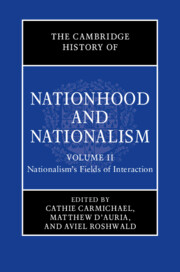Book contents
- The Cambridge History of Nationhood and Nationalism
- The Cambridge History of Nationhood and Nationalism
- The Cambridge History of Nationhood and Nationalism
- Copyright page
- Contents
- Figures
- Tables
- Contributors
- Part I Imperial and Postcolonial Settings
- Part II Transnational and Religious Missions and Identities
- 15 Liberalism and Nationalism: Trajectories of an Entangled Relationship
- 16 Marxism and the National Question
- 17 The Catholic Church
- 18 Islam and Nationalism
- 19 On Jewish Nationhood and Nationalism: A Historical Survey from Antiquity to the Establishment of the State of Israel
- 20 Buddhism
- Conclusion to Part II
- Part III Intersections: National(ist) Synergies and Tensions with Other Social, Economic, Political, and Cultural Categories, Identities, and Practices
- Index
- References
20 - Buddhism
from Part II - Transnational and Religious Missions and Identities
Published online by Cambridge University Press: 08 November 2023
- The Cambridge History of Nationhood and Nationalism
- The Cambridge History of Nationhood and Nationalism
- The Cambridge History of Nationhood and Nationalism
- Copyright page
- Contents
- Figures
- Tables
- Contributors
- Part I Imperial and Postcolonial Settings
- Part II Transnational and Religious Missions and Identities
- 15 Liberalism and Nationalism: Trajectories of an Entangled Relationship
- 16 Marxism and the National Question
- 17 The Catholic Church
- 18 Islam and Nationalism
- 19 On Jewish Nationhood and Nationalism: A Historical Survey from Antiquity to the Establishment of the State of Israel
- 20 Buddhism
- Conclusion to Part II
- Part III Intersections: National(ist) Synergies and Tensions with Other Social, Economic, Political, and Cultural Categories, Identities, and Practices
- Index
- References
Summary
Buddhist nationalism has emerged again as a topic of scholarly and media attention, driven primarily by campaigns of violence and expulsion against Muslims in Myanmar, but also by similar dynamics in Sri Lanka and Thailand. Recent research on the intersections between Buddhism and nationalism not only follows the scholarly critique of methodological nationalism – resisting the urge to naturalize the nation and read it back anachronistically into history – it also questions assumptions of Buddhism as a unitary or even stable object of inquiry. “Buddhist nationalism,” where it exists, does not necessarily follow a set pattern; moreover, it is the conscious and largely intentional creation of actors with the relevant authority and stature to frame the two components as intrinsically connected. In doing so, they construct it through narratives and symbols of legitimation that are recognizably Buddhist and linked to particular cultural, ethnic, or political configurations.
- Type
- Chapter
- Information
- The Cambridge History of Nationhood and Nationalism , pp. 437 - 458Publisher: Cambridge University PressPrint publication year: 2023

